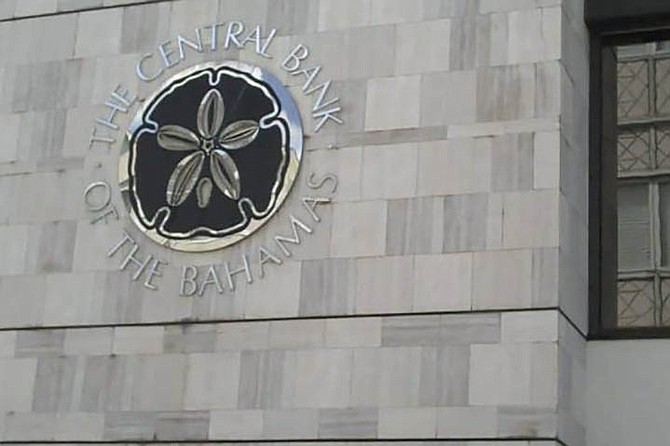By NEIL HARTNELL
Tribune Business Editor
nhartnell@tribunemedia.net
The Central Bank has conceded that Hurricane Dorian’s devastation has prompted a rethink on permitting its financial institution licensees to store confidential client data overseas.
The monetary regulator, in its analysis of the “lessons” learned from the category five storm, said customer confidentiality now needed to be balanced with financial system resilience and the need for critical data to be backed-up outside The Bahamas.
“Paper documents do not work in a world of 200 mile per hour winds and 20-plus foot storm surges,” the Central Bank said, in a nod to Dorian’s destructive powers. “Even if the documents themselves survive the destruction, they may be housed in sites that are no longer accessible.
“The Bahamian financial system has already made substantial strides towards electronic documents. The Central Bank’s view is that our financial system must become fully protected against the loss or inaccessibility of physical documents.”
It added: “Electronic documents do not work in a world of 200 mile per hour winds and 20-plus foot storm surges either - unless they are robustly backed up, either in The Bahamas or internationally.
“Traditionally the Central Bank has focused upon customer confidentiality when considering offshore data repositories. We will now balance this focus with a consideration of the resilience benefits attaching to multi-country electronic data storage.”
The Central Bank also conceded that The Bahamas’ domestic financial system must become completely paperless to achieve “the levels of disaster resilience that we need”. It argued: “One essential element in this outcome is the widespread but not yet universal use of electronic documents. The Bahamian financial system will need to become fully electronic to maintain the levels of disaster resilience we need.
“Across our domestic supervised financial institutions (SFIs), however, queue management at physical branches has sometimes presented a challenge in the COVID environment. We need to ensure that all or nearly all domestic clients have good access to electronic payments and ideally electronic banking channels.”
The Central Bank added that its licensees also needed to treat staff safety, and that of their families, as a priority following a catastrophic hurricane. “It is not enough to restore the SFI’s facilities if the SFI’s staff have no place to live,” it said.
“For international SFIs, back-up arrangements in other countries through outsourcing arrangements may be the best answer. For domestic institutions, various forms of staff emergency housing may need to feature in contingency plans.”
The regulator continued: “The Central Bank intends to construct a new headquarters in Nassau, and work has commenced on this project. The new headquarters building will withstand a Category five hurricane and associated storm surge, and will allow not only staff but staff families to shelter on-site.
“The Central Bank intends similar arrangements for a new currency and coin storage and distribution centre on New Providence. For several years, the Central Bank has moved current and archived documents to electronic storage. The COVID work from home arrangements have demonstrated that over 90 per cent of Central Bank staff are able to effectively access documents.”
As for the ramifications for Know Your Customer (KYC) compliance, the Central Bank said it has “encouraged SFIs to move away from customer verification and communication, via physical documents and mail, to electronic communications channels.
“The current rule for SFIs is that they must be able to communicate with clients through at least two methods, only one of which can be physical mail. The Central Bank is likely to undertake more work in this space,” it added.
“Experience demonstrates that, after a disaster, the mails will not work well, and the clients may not be at their former physical addresses. Those same clients are more likely to retain their mobile phone numbers and their e-mail addresses.”





Comments
tribanon 5 years, 7 months ago
Like so many other government capital expenditure plans, the Central Bank's plans to build a new costly headquarters for itself needs to be put on indefinite hold. The Central Bank should be well aware of the need to conserve our country's scarce hard currency reserves by indefinitely postponing such non-critical capital projects.
ThisIsOurs 5 years, 7 months ago
This will ultimately mean loss of jobs in the IT sector.
tribanon 5 years, 7 months ago
Not just IT jobs. Once all of the client data gets moved to secure servers in one or more other jurisidictions there will be no need to keep more than the bare minimum number of Bahamian employees to create the aura of a physical presence in the Bahamas.
tetelestai 5 years, 7 months ago
Firstly, our IT departments are vastly over-staffed anyway - for the work that they do. So, rightsizing is quite fine in this situation. Secondly, the US already has the same requirement that John is positing here - idiotic, really, that in this day and age, we demand data to be in The Bahamas - and they have not experienced in significant decrease in IT related jobs (India and Singapore also have similar requirements and have not experienced any significant reductions in IT staff). Thirdly, newly revamped data protection laws have, in the main, required international firms to keep date in the bank's home office. So, we will have little choice but to comply. John is just getting ahead of it before the stuff hits the fan.
Sign in to comment
OpenID